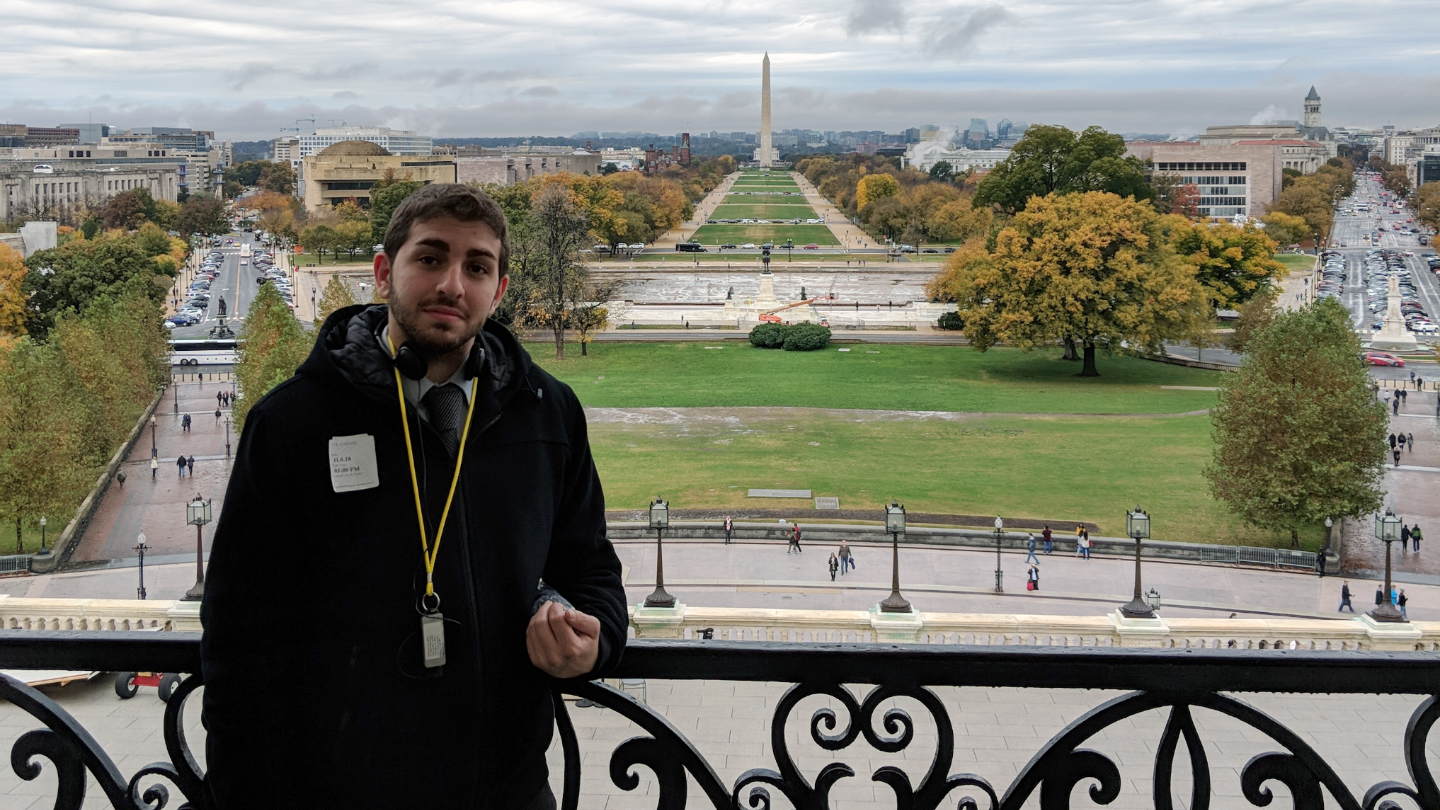Friday, Feb 8, 2019
Mark Myers of the homeland security program conducted research on healthcare, immigration and veterans affairs
by Adam Grybowski
For three months last fall, Mark Myers rose each weekday from his temporary residence in Washington, D.C., and reported to the Eisenhower Executive Office Building, which is located right next to the White House. He had landed an internship with the White House Internship Program and was assigned to the Domestic Policy Council, which has been providing strategic advice to the president since it was created by Ronald Reagan in 1985.
As an intern, Myers, a student in Rider University’s Master of Arts in Homeland Security program, conducted research on a variety of domestic policy topics, including healthcare, immigration and veterans affairs.
"I researched various immigration issues and was able to gain a better understanding of the challenges we face on our southern border," he says. "The research tasks I was assigned were substantive, and allowed me to build upon the skills I began developing in my academic endeavors.”
The work of the Domestic Policy Council staff contributes to the U.S. government’s efforts to keep all Americans safe. “The job was fast-paced and hands-on, and everyone there, from those in the printing office to the supervisors, was upbeat,” Myers says. “Everyone was focused on the mission. It was a fascinating place to intern."
He was intent on making the most of his opportunity. Participating in several volunteer activities is a required part of the internship. Myers participated in eight. “It was a good way to be involved and see how you’re making an actual difference,” he says.
The internship was, to this point, the pinnacle of Myers' commitment to contributing toward the safety and well-being of his community and his country. The source of his desire to give back was a grave childhood illness. Around age 3, Mark was diagnosed with a bone tumor in his left leg. His mother, a nurse, insisted her son receive the best treatment and wanted to send him to the renowned Memorial Sloan Kettering Cancer Center in New York. The family’s insurance wouldn’t pay for such services, Myers says.
Distraught, Myers’ family reached out to the media. TV and radio coverage drove awareness of his story to the point that members of the community banded together to help the family pay for treatment at Sloan Kettering. There, doctors successfully removed the tumor from Myers’ leg. Within two years, he was walking again.
Myers believes the community’s contributions saved his leg from potentially being amputated at a lesser hospital. As he got older, the impact of their generosity sunk in. “Because they helped me, it made me want to give back and help the community,” he says.
Growing up, he also witnessed the toll of regional natural disasters such as Hurricane Sandy. In and around his hometown of Hillsborough, N.J., he and his neighbors went without power for days. He was aware that others weren’t as lucky. The storm destroyed many homes and permanently displaced some residents. Myers pledged to participate in the cleanup and recovery efforts. “The recovery was slow and I wanted to become more involved,” he says.
More to the point, he knew he wanted to play a role in ensuring that such a catastrophe wouldn’t happen again. After graduating with a bachelor’s in political science from Fairleigh Dickinson University in 2017, he enrolled in Rider’s master’s program in homeland security. He considered law school but was aware of the surplus of lawyers in the job market, which would hurt his career prospects. “I wanted to do something I was passionate about,” Myers says. “I researched homeland security programs and found Rider’s to be the best in the state, with excellent professors.”
Rider’s 36-credit Master of Arts in Homeland Security, offered through the College of Liberal Arts and Sciences, prepares professionals for leadership roles in protecting the U.S., its interests and its allies from terrorist attacks, as well as responding to natural disasters and other threats. The program’s faculty is comprised of scholars and professionals with significant real-world experience, such as former Pennsylvania Gov. Mark Schweiker, who shares his considerable emergency management, crisis response and counter-terrorism experience to support Rider's homeland security program as executive in residence to the University’s Department of Political Science.
Back from his experience, Myers is finishing up his final semester in the program and looking forward to a career in either the private or government sector, specifically in the field of emergency management. After the internship, he is leaning toward focusing his job search in participating in government at the federal level. “I got to see how the federal government interacted with state governments and reached people in the community and how, overall, government is meant to improve people’s lives,” he says.
The sense of place he felt living in the nation’s capital made a mark too.
“Every day you got to walk out and look at the White House and see all the historical sights,” Myers says. “You realize you’re taking part in history. To actually be there really installs in you a feeling of awe.”

